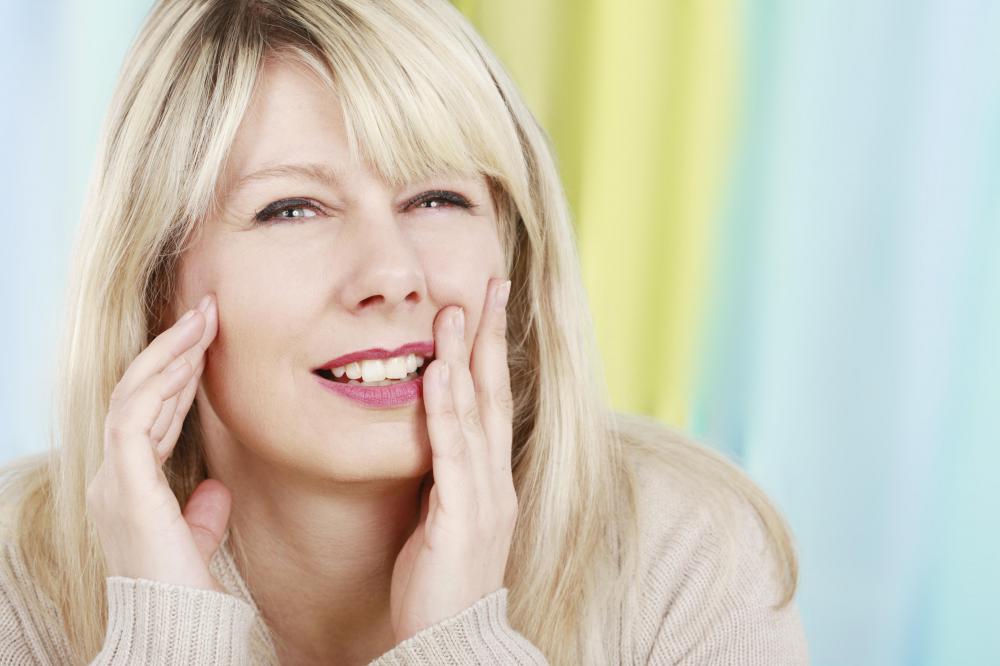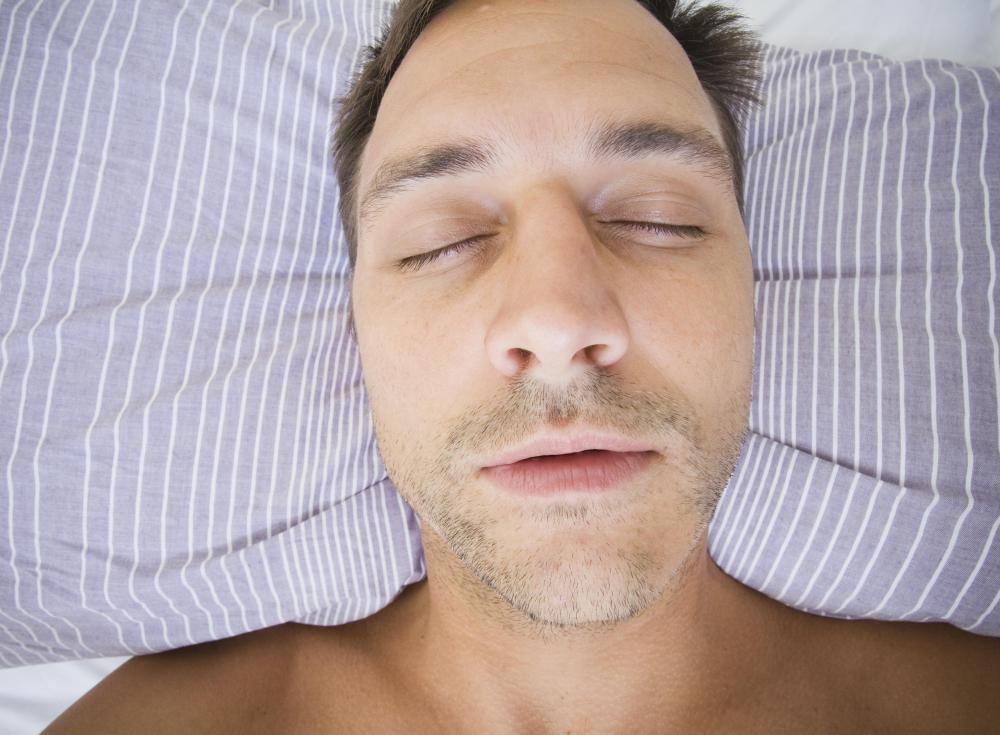At WiseGEEK, we're committed to delivering accurate, trustworthy information. Our expert-authored content is rigorously fact-checked and sourced from credible authorities. Discover how we uphold the highest standards in providing you with reliable knowledge.
How can I Stop Grinding my Teeth?
Grinding the teeth, or bruxism as it is officially termed, is a serious dental condition in which the sufferer grinds his or her teeth during sleep. Though many are not aware that they are grinding their teeth during the night, bruxism can damage the teeth and jaw and cause headaches and facial soreness. To prevent such problems, it is important to do everything one can to stop grinding the teeth during sleep.
Unfortunately, there is no surefire way to stop grinding the teeth. Since it happens when the sufferer is unconscious, he or she has minimal control over the behavior. The most common remedy is a mouthguard or splint which prevents damage to the teeth, though it does not necessarily stop grinding behavior. Therefore, headaches and jaw soreness may persist.

A mouthguard used to treat bruxism may be custom-fitted, either through a dentist visit or by using a kit at home to make a mold of the teeth. There are also over-the-counter one-size-fits-most versions, but they do not fit as well and may be less comfortable for some users. Different patients have different experiences with mouthguards. Some find that it helps them stop grinding the teeth, while others grind their teeth more when wearing a mouthguard. For others, the mouthguard is initially effective, but becomes less so over time.

Other ways to reduce or stop grinding the teeth include reducing stress and consciously relaxing during the day and before bed, learning the correct positions in which to hold the jaw and tongue, and limiting alcohol intake. It is important to achieve adequate amounts of sleep and exercise as well. To treat jaw and muscle pain associated with bruxism, try massage and heat applications to the affected areas. Keep the teeth separated and the jaw relaxed during the day, and avoid hard or chewy foods.

In extreme and persistent cases, orthodontic adjustments or surgery may be the only way to stop grinding the teeth. While psychological and muscle memory causes are possible, bruxism may also be caused by misaligned teeth. Surgery is considered a last resort to stop grinding the teeth. However, if you know or suspect that you suffer from bruxism, it is important to see a dentist as soon as possible to prevent irreversible damage to the teeth. He or she will be able to help you find the best ways for you to stop grinding your teeth.
AS FEATURED ON:
AS FEATURED ON:

















Discussion Comments
I happen to grind my front tooth most of the day and all night long. Sadly, I think this is due to the fact that I'm missing one molar. At this time, I haven't a job, so I can't afford a bridge.
It's a habit. I can't explain how it happened, but I never had this before, even with that tooth missing, so I truly can't tell you how this came to be.
I'm also very stressed due to no employment, so perhaps this may be the reason. For now, I use my mouth guard. The only time when I don't grit my teeth is the angle of my jaw. If I'm looking down, it never happens, but who looks down most of the day? I usually never do this in the gym either. I have no idea why that is, but I look forward to going since I don't grit my teeth!
Hopefully, when I gain employment, I'll be able to afford that crown. I pray that cures this horrible habit.
@ Amphibious and PelesTears - There are some homeopathic and herbal remedies that you can use that may help. Valerian root tincture or rescue remedy can be really good at relieving stress and aiding in sleep. I have problems sleeping when I am stressed and these usually help me relax. You can also use the supplement melatonin. I usually take valerian root tincture mixed into a glass of water a half hour before bed. The cocktail wears off by morning, and I feel refreshed when I wake up. Plus, these remedies are much milder than over the counter sleeping aids. Another thing you can do is work out a couple hours before bed. Working out is great for relieving stress. People also tend to go into a deeper sleep when they push their muscles to exertion. Sleep is when muscles repair themselves, so working out can tell your brain to go into sleep mode. Just be warned; it can take a couple hours for the body to wind down after a workout.
@PelesTears - I also grind my teeth and clench my jaw. I probably do it out of stress as well. My fiancée and I are full-time students, working, and raising a toddler that is entering her terrible twos early. Needless to say, I rarely have a stress free moment (I enjoy it all though!). I have tried mouth guards, but like you they did not work for me. After reading your post, I think I should try adjusting my day so I have time to relax towards the end of the day. I usually have my last espresso at 8pm, go to bed around 1:30 am, and get up at 7:00 am. I think the toughest part is trying to figure out what I can sacrifice to free up some time. I have to do something though, because the clenching has given me problems with the ligaments in my jaw. The grinding has caused me to crack four molars and chip a front tooth. One tooth was so bad that I had to have a root canal and get it crowned (I hate the dentist!). I need to get two more root-canals and a veneer within the next couple years to permanently fix my teeth. I think my dental bill will end up costing me the same as a year’s tuition when it’s all over and done with.
In the last few years I have struggled with grinding my teeth at night. I believe that most of the tooth grinding is due to stress because I tend to not grind my teeth as often when I am relaxed. It is hard to deal with, though. I have tried the mouth guards, but I always wake up with the mouth guard tangled in my sheets, or more jaw pain because I have been grinding my teeth even harder. Now I don't even use the mouth guard. My best defense has been to consciously pay attention to my stress level. I usually try to give myself a wind down period before bed, and no caffeine within 5 hours of going to sleep.
Post your comments